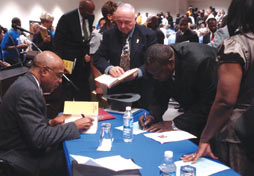By Randi Johnson/reporter
The mental capacity of retaining and reviving facts, events or impressions is the memory, a South Campus counselor told students last week.
“ Memory is something you do, not something you have,” Annie Dobbins said.
Dobbins presented Improving Your Memory Helps Raise Your Grades Oct. 30 as part of the student success seminars.
The seminar began with a quick-paced memory game to show the possibility of training the brain to remember.
Dobbins used an adjective and a name of a vehicle to associate each person in the room. At the end of the exercise, the attendees knew “kind Karen who loves Kias” and every other student’s name in the room.
Dobbins said students can use several techniques to help increase memory capacity. She said students must be in the correct mind-set before studying.
“ Is your glass half empty or half full?” Dobbins asked the group of students in attendance.
“ It is important to begin studying with a positive outlook. Even though you may not like what you’re studying, trying to enjoy it will make it easier to remember,” she said.
Dobbins said many techniques, such as grouping, acronyms, mnemonics and repetition, have been proved to aid in memory.
Dobbins then outlined four tools to concentrate on to improve the capacity of the memory.
First, students should organize the information. This task can be done by sorting general to specific details.
Second is using the body to help remember. Whether doing, seeing or hearing the task at hand, the process will increase the chances of the information being stored in memory.
Dobbins said people retain the following amounts of information by using their bodies: 90 percent of the things they do, 75 percent of the things they see and 20 percent of the things they hear.
Using the body to make information interesting by visualization, association or personalization increases the ability to recall the information from memory, the counselor said.
“ Sometimes we can’t do everything we read,” she said, “but instead try to visualize being there or doing what you are reading.”
The third skill is using the brain.
Dobbins said having the right attitude and being positive about learning new information will help students train the brain to recite the information it is fed.
The final stage, Dobbins said, is recalling the information.
After organizing, using the body and using the brain, students should test their memory by recalling the information.


























